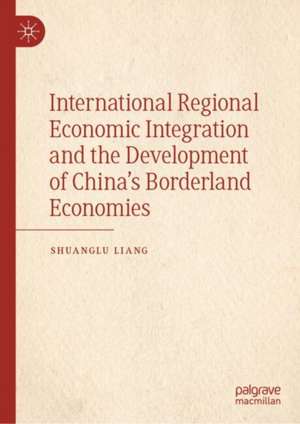International Regional Economic Integration and the Development of China’s Borderland Economies
Autor Shuanglu Liangen Limba Engleză Hardback – 4 sep 2024
Preț: 728.74 lei
Preț vechi: 888.71 lei
-18% Nou
Puncte Express: 1093
Preț estimativ în valută:
139.44€ • 145.98$ • 115.38£
139.44€ • 145.98$ • 115.38£
Carte disponibilă
Livrare economică 15-29 martie
Preluare comenzi: 021 569.72.76
Specificații
ISBN-13: 9789819730438
ISBN-10: 9819730430
Pagini: 250
Ilustrații: Approx. 250 p.
Dimensiuni: 148 x 210 x 20 mm
Greutate: 0.48 kg
Ediția:2024
Editura: Springer Nature Singapore
Colecția Palgrave Macmillan
Locul publicării:Singapore, Singapore
ISBN-10: 9819730430
Pagini: 250
Ilustrații: Approx. 250 p.
Dimensiuni: 148 x 210 x 20 mm
Greutate: 0.48 kg
Ediția:2024
Editura: Springer Nature Singapore
Colecția Palgrave Macmillan
Locul publicării:Singapore, Singapore
Cuprins
Chapter 1 A Summary of Theoretical Studies on International Regional Economic Integration and China's Borderland Economic Development.- Chapter 2 The Process and Attributes of Regional Economic Integration between China and Neighboring Countries.- Chapter 3 The boundary effect in the process of integration and the growth mechanism of the edge economic growth enter.- Chapter 4 The Border Effect in the Process of integration and the Development of China's Border Trade.- Chapter 5 The Border Effect in the Process of Integration and Industrial Upgrading in China's Border Areas.- Chapter 6 Border effect in the process of integration and the development of China's frontier cities.- Chapter 7 Research on the environment, system and policy for promoting the growth of China's border economic growth center.
Notă biografică
Shuanglu Liang is a Ph.D. in economics and a researcher at the School of Economics at Yunnan University. Liang’s research interests include spatial economics, frontier economics, national economics and innovation economics.
Textul de pe ultima copertă
China’s borderland economy has grown significantly recently, thanks largely to a favorable institutional environment created by national strategies such as the development of the western part of China, revitalization of old industrial bases in the northeast, and the anti-poverty campaign. This work draws on theories of international economics and spatial economics to study the regional economic integration of China's border areas, with the aim of shedding light on how to improve policies and practices. It discusses topics such as the transformation of border trade, industrial upgrading and urbanization in borderlands , especially in the context of cross-border economic integration. Furthermore, the book also explores ways in which changes in the border might contribute to the formation of peripheral economic growth centers, and related environmental, institutional and policy issues. It will interest scholars of Asian economic trends and the rise of China, particularly in Southeast Asia.
Shuanglu Liang is a Ph.D. in economics and a researcher at the School of Economics at Yunnan University. Liang’s research interests include spatial economics, frontier economics, national economics and innovation economics.
Shuanglu Liang is a Ph.D. in economics and a researcher at the School of Economics at Yunnan University. Liang’s research interests include spatial economics, frontier economics, national economics and innovation economics.
Caracteristici
analyzes the role of infrastructural development explores China's investments in SE Asia Projects economcic integration
